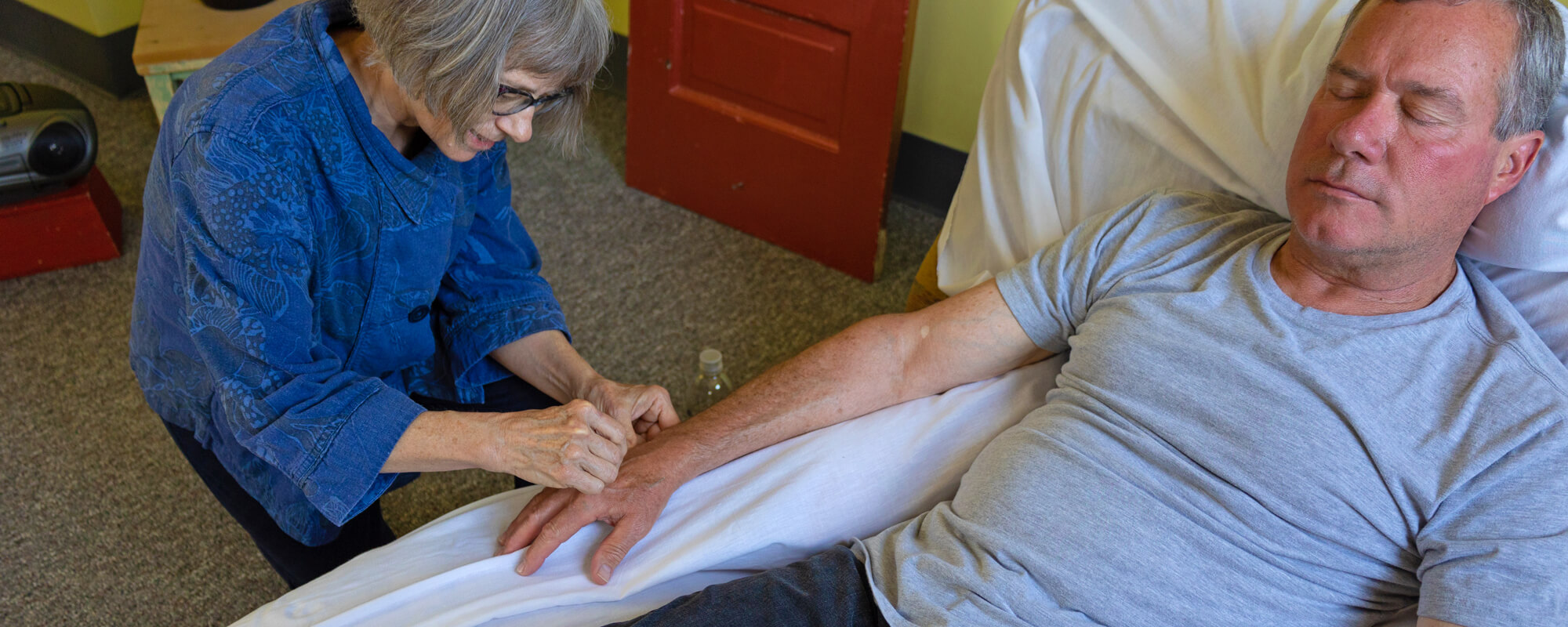- WE MOVED !!!
-
 Professional Acupuncture & Physical Therapy1118 East Superior Street
Professional Acupuncture & Physical Therapy1118 East Superior Street
Duluth, MN 55802(218) 724-3400 Clinic Hours
Mon9:00 am - 6:00 pmTue9:00 am - 6:00 pmWed9:00 am - 6:00 pmThu9:00 am - 6:00 pmFriCLOSED

- Long Covid Booklet
Traditional Chinese Medicine
Acupressure Points for Pneumonia & Common Cold
Acupressure, a traditional Chinese medicine practice, involves applying pressure to specific points on the body to promote healing and relieve symptoms. While it’s not a substitute for medical treatment, especially for serious conditions like pneumonia, acupressure may be used as a complementary therapy to help manage symptoms.
Here are some acupressure points that are commonly recommended for respiratory issues, which may be relevant to both viral and bacterial pneumonia:
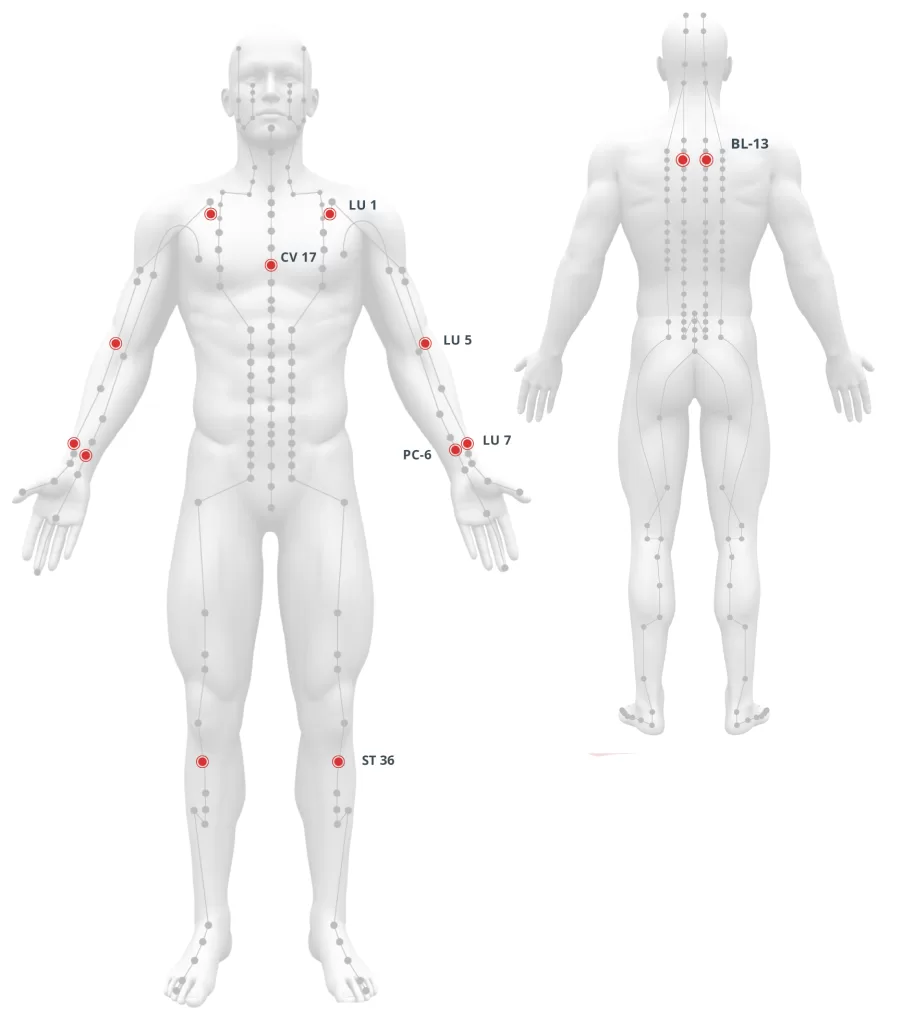
1. LU-1 (ZHONGFU)
Located on the chest, just below the clavicle. This point is believed to help with breathing difficulties and lung health.
2. LU-5 (CHIZE)
Found on the elbow crease, on the thumb side. It’s said to be effective in clearing phlegm and easing cough.
3. LU-7 (LIEQUE)
Located above the wrist on the inner arm. It’s often used for relieving symptoms like cough,
headache, and sore throat.
4. ST-36 (ZUSANLI)
Located below the knee. This point is thought to strengthen overall energy and immunity, which can be beneficial in recovery.
5. CV-17 (DANZHONG)
Situated in the center of the chest. This point is commonly used for respiratory health, including easing breathing difficulties and cough.
6. BL-13 (FEISHU)
Located near the spine, directly opposite LU1. This point is specifically associated with lung health and may help ease breathing.
7. PC-6 (NEIGUAN)
Found on the inner arm, a few inches above the wrist. It’s known for its effectiveness in relieving nausea and improving chest discomfort.
Acupressure can be a supportive tool for overall wellness and symptom management, but it’s essential to prioritize and follow medical advice for serious health conditions.
Important Considerations:
Consult a Professional: It’s advisable to consult with a healthcare provider or a certified acupressure practitioner, especially when dealing with serious health conditions like pneumonia.
Gentle Approach: Apply pressure gently, especially on sensitive areas or if you’re new to acupressure.
Avoid Overexertion: If any point feels too painful, reduce pressure or stop.
Not a Substitute for Medical Treatment: Acupressure should not replace conventional medical treatment, especially for conditions like pneumonia which can be life-threatening if not properly treated.
What You Can Do About Chest / Breast Pain
Chest pain is not something to be taken lightly, as many times it can be a precursor to something more serious like a heart attack. Therefore it is always recommended a person suffering from chest pain be checked out by a doctor, especially when that pain appears out of nowhere. Chest/breast pain can be an indication of many other problems too. For instance, anxiety, grief, depression, poor diet, external factors like a cold, accumulation of breast milk or even fatigue can all be factors when a person is experiencing chest/breast pain.
As long as the chest/breast pain is not cardiac related, Traditional Chinese Medicine can be a helpful tool for treating the pain. Acupuncture is one of the modalities used by TCM practitioners to help alleviate pain. Acupuncture helps the body heal itself by releasing endorphins, which are natural painkillers. Acupuncture also helps to dislodge or drain areas of stagnation commonly associated with pain. Think of a cyst. This is a type of stagnation in TCM and acupuncture can help break up these areas of stagnation and restore proper flow of both blood and lymph to the affected areas.
Chest/breast pain can involve many different organs and energetic pathways. The heart, lungs and stomach can all be affected. Therefore, the TCM practitioner must be able to determine the proper diagnosis before
treating each patient. Chest colds are treated much differently than a person suffering from chronic grief over the loss of a loved one. Since chest pain can be a result of an excess condition or a deficiency, the treatments will be very different. The TCM practitioner may suggest certain foods, exercises or overall lifestyle changes that will help the patient heal over time.
Foods
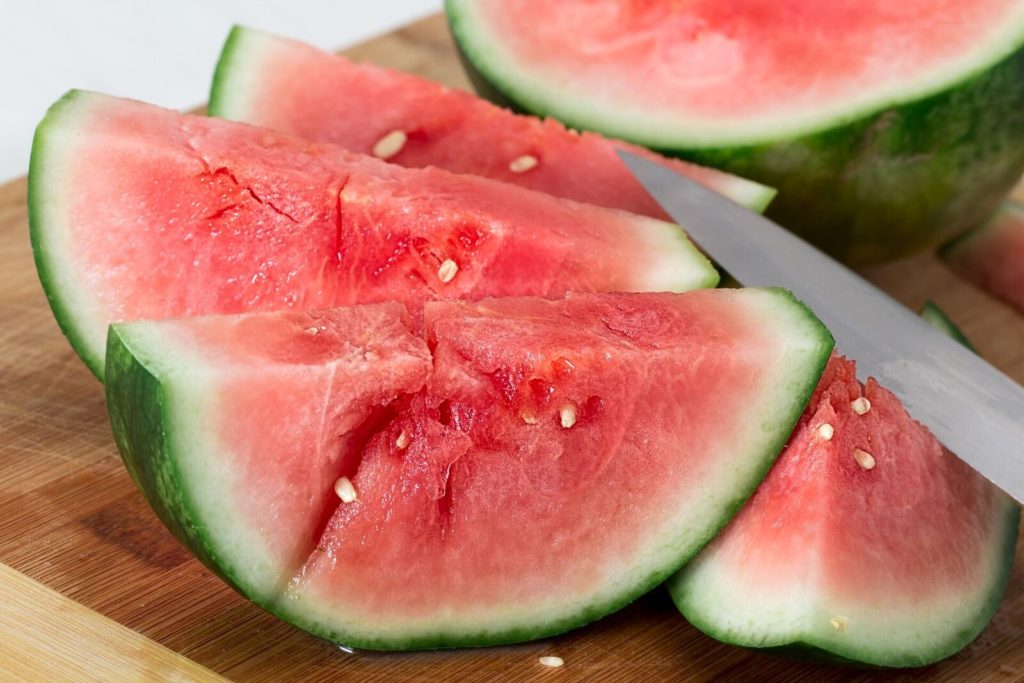 Ginger – This slightly spicy root has anti-inflammatory and antioxidant properties, which can help soothe an upset stomach that may be causing chest pain and acid reflux.
Ginger – This slightly spicy root has anti-inflammatory and antioxidant properties, which can help soothe an upset stomach that may be causing chest pain and acid reflux.
Cucumber – Cooling and draining in nature, this food helps to cleanse the lungs of mucus and phlegm, which can help relieve chest congestion and pain.
Kale – Full of vitamins, this leafy vegetable can cleanse the body of toxins that may be causing pain.
Melons – Due to the cooling nature of most melons, they are great for draining excess heat in the chest area.
Lifestyle
Excessive stress, anxiety and worry are all contributors to chest/breast pain. One way to combat these negative emotions is through the use of meditation. Meditation can be very beneficial when practiced regularly.
Avoiding the excessive consumption of dairy products, sweets, greasy foods, deep-fried foods, spicy foods and alcohol can also help greatly in the prevention of chest pain and breast pain.
Lastly, doing regular chest opening type stretches will help prevent and decrease any pectoral pain and re-establish proper blood flow into the area.
Most Common Illnesses Acupuncture is Used to Treat
Acupuncture is an ancient treatment modality that is backed by thousands of years of documented success. Unfortunately, it is often used as a treatment of last resort. This is because our education is grounded in western science, which has no clear explanation for why or how acupuncture works. It is unfortunate because, in comparison to surgery and prescription painkillers, acupuncture is virtually painless, side-effect free, and imposes zero additional recovery time on the patient after each treatment session is completed.
When people do eventually come to acupuncture, they find it to be as, or more effective than other treatments they have tried so far. This is especially true for the treatment of chronic pain, inflammatory disorders, addiction, and more.
Acupuncture in Pain Management
Where this treatment modality shines is in managing pain. Acupuncture alters the way the nervous system functions, by allowing it to send fewer unnecessary pain signals to the brain. It does this by tapping into the ability of the brain and the nervous system as a whole to manage pain in healthy ways.
Consider the way a small child reacts to pain compared to an adult. When children get a bump or scrape, they often cry bitterly as if they have been badly wounded. An adult’s pain response will tend to be less pronounced. This is because an adult will know on an experiential level and an intuitive level that superficial damage is not a threat to her or his existence.
In short, our nervous systems mature as we do. Therefore, it can be said- based on long experience with the practice- that acupuncture can help our nervous system to develop more refined responses to pain.
Common Types of Painful Illnesses That are Successfully Treated Using Acupuncture
You will find that the types of pain acupuncture is best at treating are the ones that are caused by a disproportionate response of the body to injury or illness. Inflammation, for example, is what happens when the body responds to a perceived threat. But that response can be harmful if it is not properly regulated.
Gastrointestinal Disorders
Damage to the gut lining and irritants in the digestive system will trigger an immune response, and causes obvious pain. Conditions like IBS result when the body cannot properly mount a well-regulated response. Acupuncture can reduce unhelpful levels of swelling in the gut.
Eye, Ear, Nose & Throat Disorders
As with gastrointestinal disorders, allergies result when an irritant is ever-present, and the body, again, mounts a poorly regulated response. Acupuncture is well suited for this type of problem.
Immune Disorders
Sometimes, hyperactive immune responses are so strong that the body’s defense systems begin to attack the body itself. Immune disorders can be devastating and sometimes painful.
Musculoskeletal And Neurological Disorders
At some point in life, everyone experiences pain caused by a musculoskeletal and/or neurological disorder. These can be caused by poor posture, injury, illness, and age. Acupuncture can help the body to refrain from delivering manic pain signals while the patient strives to heal.
Ways to Keep Kids Off Electronics
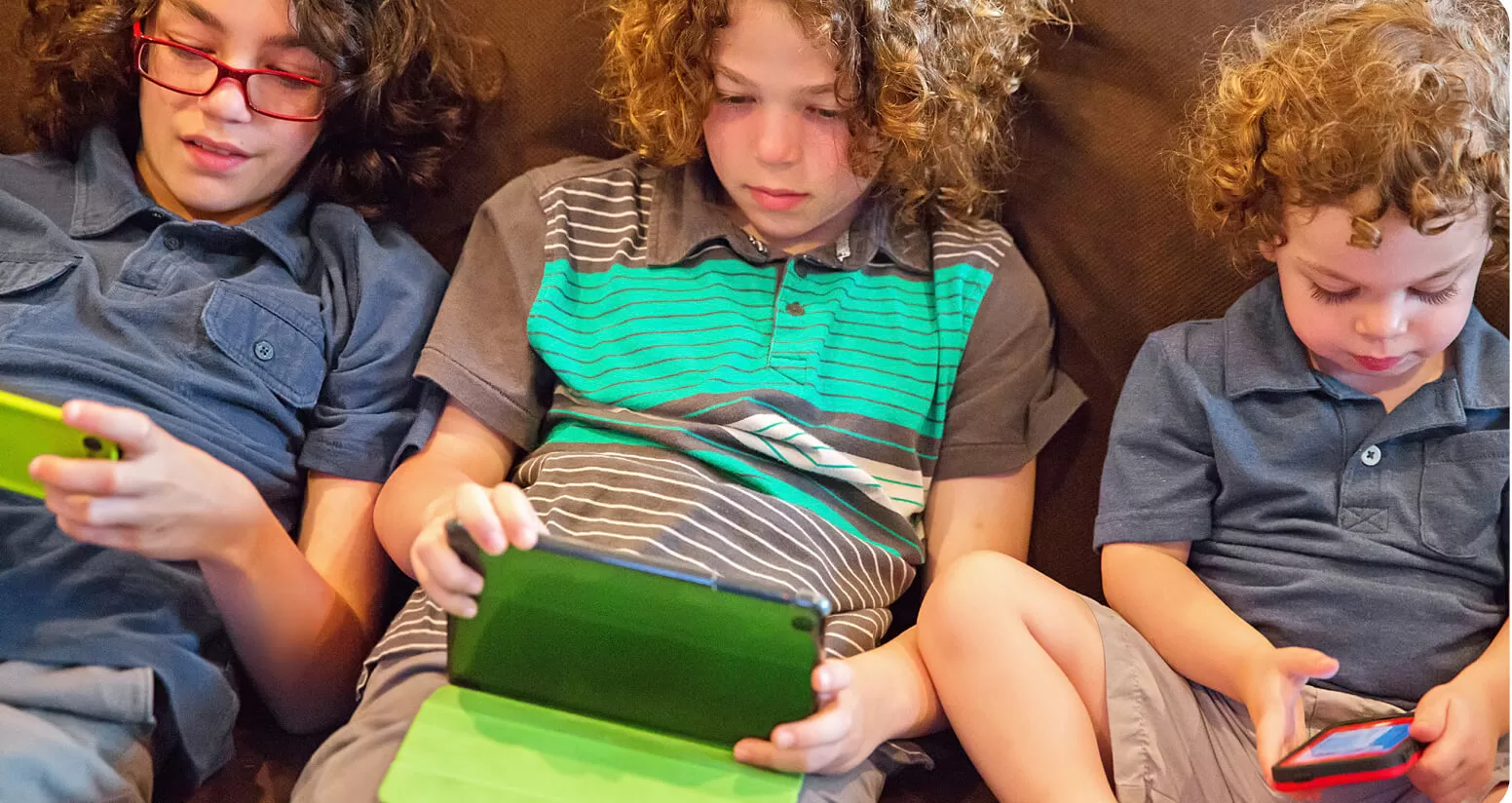 In this day and age, kids seem to always be glued to some sort of electronic device. Whether it is a phone, computer or tablet, there is always some form of technology kids can get their hands on, As a parent, it can be frustrating and difficult to limit screen time. Below are some alternatives to keep your kids occupied and having fun without the need for a screen!
In this day and age, kids seem to always be glued to some sort of electronic device. Whether it is a phone, computer or tablet, there is always some form of technology kids can get their hands on, As a parent, it can be frustrating and difficult to limit screen time. Below are some alternatives to keep your kids occupied and having fun without the need for a screen!
Get them outside - One of the best ways to keeps kids not only occupied but healthy is to get them playing outside. Whether it is hiking or playing catch, the outdoors have been proven to improve physical health as well as mental wellbeing. Studies have shown that kids who get more outdoor time can have reduced symptoms of ADHD. It is a great opportunity for children to let out energy in a constructive way while having fun.
Head to the library – Reading is a great pastime for a number of reasons. Making books and reading a regular activity in your household will not only help your child improve their reading skills, but will keep them focused and their imagination active. Take them to the library to explore and find what types of books they really like.
Consider a family pet -
Family pets have benefits not only for kids but parents as well. They can be great companions for kids and their emotional development. Studies have shown that children who grow up with animals are better adjusted later on in life. Pets encourage nurturing, comfort and responsibility.
Make chores fun
Chores can be a drag, but also are important for children to learn responsibility and keep them busy and off their electronics. Make chores a game or a competition. Set goals and tell them when they complete a certain task they are on to the next “level”. Make chores a task that kids will look forward to doing!
It is especially important to limit screen time in summer when kids are out of school. Signing them up for a day camp or sport activity during summer can help keep them active and social. There are many different types of camps for kids from theatre and dance to outdoor and sport camps. This is also a great way to get them off your plate for a bit!
3 Sitting Exercises for Weight Loss
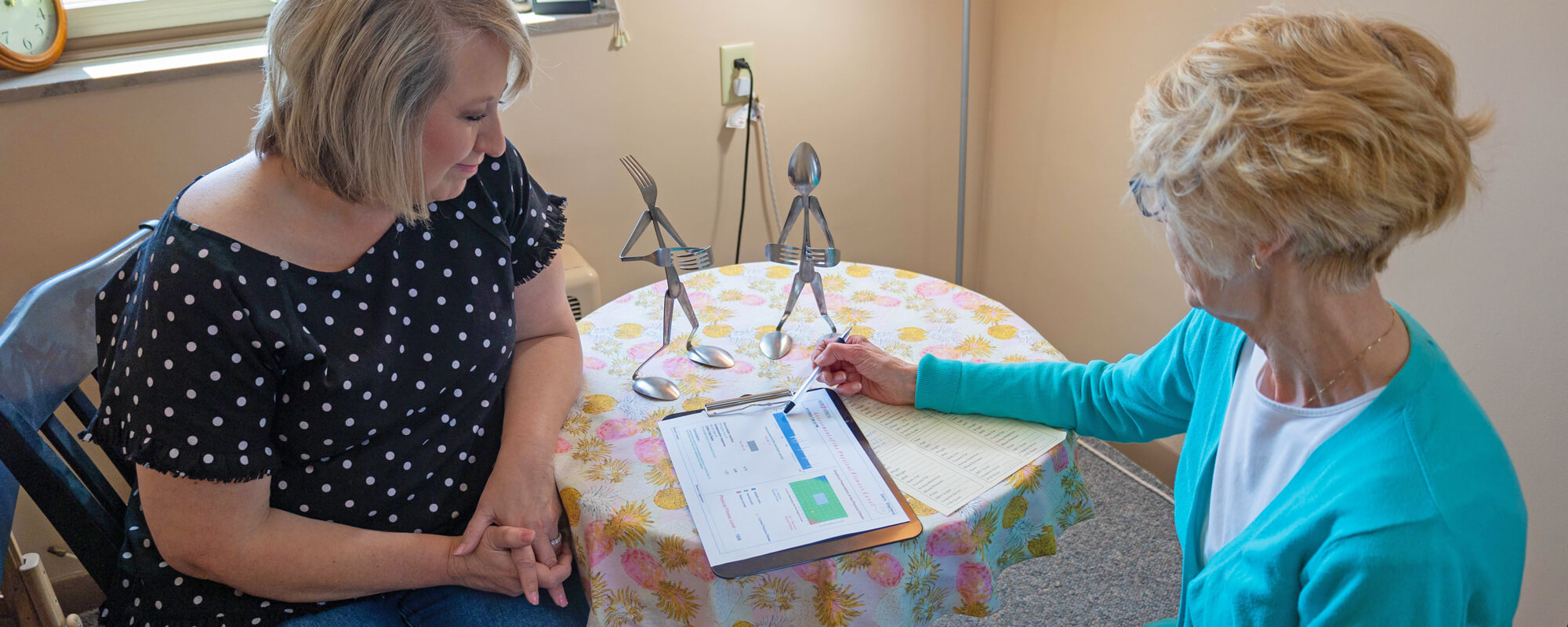 Whether we are at the office, in the car or at home, we spend much of our day sitting down. So much time in fact that it can impact how active we are throughout the remainder of our day. Because of the amount of sitting we do, it can be hard to find times to be active and burn calories. If you still want to lose weight, but can’t avoid the huge amount of sitting throughout your day, check out these three sitting exercises that promote healthy weight loss.
Whether we are at the office, in the car or at home, we spend much of our day sitting down. So much time in fact that it can impact how active we are throughout the remainder of our day. Because of the amount of sitting we do, it can be hard to find times to be active and burn calories. If you still want to lose weight, but can’t avoid the huge amount of sitting throughout your day, check out these three sitting exercises that promote healthy weight loss.
1. Replace your chair
This is a super easy way to get in some key exercise while you are sitting at work. Take your old office chair and replace it with an exercise ball. More specifically, a stability ball. A stability ball will help you tighten and strengthen various parts of your body, including your core, leg and back muscles. It has been proven that when you do this you can burn up to an extra 100 calories a day!
2. Set healthy reminders for yourself
This is a simple practice that can greatly improve your health, quality of life and weight. If you set healthy reminders for yourself throughout the day while at work you can avoid staying stagnant and eating potentially unhealthy foods. For example, set reminders on your phone to tell yourself to get up and walk around the office for a few minutes, or to walk up and down a set of stairs. In addition, you can set reminders telling yourself what snacks you should eat during the work day, or what healthy option you should have during your lunch break.
3. Drink lots of water
Hydrate. Hydrate. Hydrate. Keeping yourself properly hydrated is very important. And by doing this you can even help yourself lose weight without getting up and impacting your work day. Drinking lots of water ensures that your metabolism and other bodily functions can work to the best of their ability. Keeping your metabolism hydrated and fully operational helps reduce your calorie intake.
